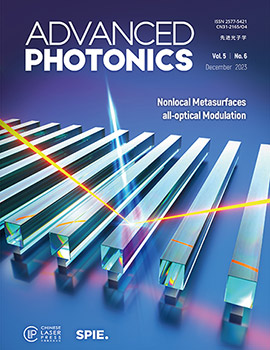Deep reinforcement learning for quantum multiparameter estimation
IF 18.8
1区 物理与天体物理
Q1 OPTICS
引用次数: 9
Abstract
Abstract. Estimation of physical quantities is at the core of most scientific research, and the use of quantum devices promises to enhance its performances. In real scenarios, it is fundamental to consider that resources are limited, and Bayesian adaptive estimation represents a powerful approach to efficiently allocate, during the estimation process, all the available resources. However, this framework relies on the precise knowledge of the system model, retrieved with a fine calibration, with results that are often computationally and experimentally demanding. We introduce a model-free and deep-learning-based approach to efficiently implement realistic Bayesian quantum metrology tasks accomplishing all the relevant challenges, without relying on any a priori knowledge of the system. To overcome this need, a neural network is trained directly on experimental data to learn the multiparameter Bayesian update. Then the system is set at its optimal working point through feedback provided by a reinforcement learning algorithm trained to reconstruct and enhance experiment heuristics of the investigated quantum sensor. Notably, we prove experimentally the achievement of higher estimation performances than standard methods, demonstrating the strength of the combination of these two black-box algorithms on an integrated photonic circuit. Our work represents an important step toward fully artificial intelligence-based quantum metrology.用于量子多参数估计的深度强化学习
摘要物理量的估计是大多数科学研究的核心,量子器件的使用有望提高其性能。在实际场景中,考虑资源是有限的是至关重要的,贝叶斯自适应估计是一种在估计过程中有效分配所有可用资源的强大方法。然而,该框架依赖于系统模型的精确知识,通过精细校准检索,其结果通常需要计算和实验。我们引入了一种无模型和基于深度学习的方法,以有效地实现现实的贝叶斯量子计量任务,完成所有相关挑战,而不依赖于系统的任何先验知识。为了克服这一需求,直接在实验数据上训练神经网络来学习多参数贝叶斯更新。然后,通过强化学习算法提供的反馈,将系统设置在其最佳工作点,该算法被训练来重建和增强所研究的量子传感器的实验启发式。值得注意的是,我们通过实验证明了比标准方法更高的估计性能,证明了这两种黑盒算法在集成光子电路上的结合强度。我们的工作代表着朝着完全基于人工智能的量子计量迈出了重要一步。
本文章由计算机程序翻译,如有差异,请以英文原文为准。
求助全文
约1分钟内获得全文
求助全文
来源期刊

Advanced Photonics
OPTICS-
CiteScore
22.70
自引率
1.20%
发文量
49
审稿时长
18 weeks
期刊介绍:
Advanced Photonics is a highly selective, open-access, international journal that publishes innovative research in all areas of optics and photonics, including fundamental and applied research. The journal publishes top-quality original papers, letters, and review articles, reflecting significant advances and breakthroughs in theoretical and experimental research and novel applications with considerable potential.
The journal seeks high-quality, high-impact articles across the entire spectrum of optics, photonics, and related fields with specific emphasis on the following acceptance criteria:
-New concepts in terms of fundamental research with great impact and significance
-State-of-the-art technologies in terms of novel methods for important applications
-Reviews of recent major advances and discoveries and state-of-the-art benchmarking.
The journal also publishes news and commentaries highlighting scientific and technological discoveries, breakthroughs, and achievements in optics, photonics, and related fields.
 求助内容:
求助内容: 应助结果提醒方式:
应助结果提醒方式:


